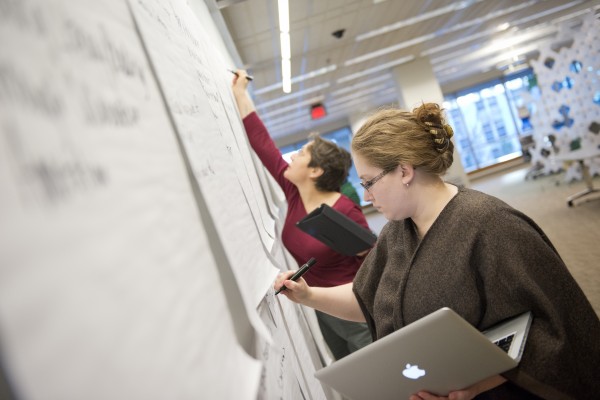Humanities scholars ‘Camp’ out

Nearly 200 humanities scholars gathered around coffee and computers in Snell Library’s new Digital Media Commons on Wednesday morning. A large wall decorated with craft paper offered dozens of topic ideas for the group to choose from as they created a schedule for their day at THATCamp (The Humanities and Technology Camp). So-called “campers” happily crowded around the wall casting their votes with colored sticky notes.
“It’s a bit chaotic but it helps everyone get into the ‘unconference’ spirit,” said Ryan Cordell, an assistant professor of English at Northeastern.
That’s right. THATCamp was an unconference. There were no preset agendas or prepared papers. Rather, four session styles—make, teach, talk, and play—allowed participants to engage in dynamic and timely discussions of the issues facing humanists as they bring their work into the digital age.
Cordell organized Wednesday’s THATCamp, the first of several to be held across the globe in 2013, to coincide with the annual meeting of the Modern Language Association, or MLA. According to Cordell, this allowed campers to “focus on the particular challenges and opportunities that technology offers for research and teaching around literature and languages.”
The event represents a broader institutional effort to promote digital humanities and computational social sciences at Northeastern. To that end, the NULab for Texts, Maps and Networks, an interdisciplinary base for researchers across the university, is expected to launch later this month.
In opening remarks, Mary Loeffelholz, the vice provost for academic affairs, reminded participants that the year MLA last came to Boston, 1952, was also the first time a computer predicted the outcome of a political election. “It was the very first election in which big data, as we now say, made an entrance,” she said, noting that the age of digital humanities has been long in the making.
By the end of the first session, 21 topics had won the vote, giving scholars occasion throughout the day to discuss everything from the aesthetics of digital humanities to the various digital tools available for literary analysis. In one session, participants learned the ins and outs of a particular open-source archive-building tool called Omeka, while in another, participants helped the MLA’s director of Scholarly Communications develop the association’s new social media platform, MLA Commons.
In keeping with the digital theme, scholars provided live coverage of their experiences through a running Twitter conversation, which revealed the many successes of the day. One participant, a doctoral candidate from the University of North Carolina, Chapel Hill, tweeted that the “session on spatial humanities just solved problems I’ve been stewing over for months.”
Elizabeth Maddock Dillon, professor of English and co-founder of NULab, asked rhetorically what “an old post-structuralist” like herself was doing in a space like the Digital Media Commons. “It’s the excitement of new ways of reading,” she answered, summing up the sentiment of many in the room.





